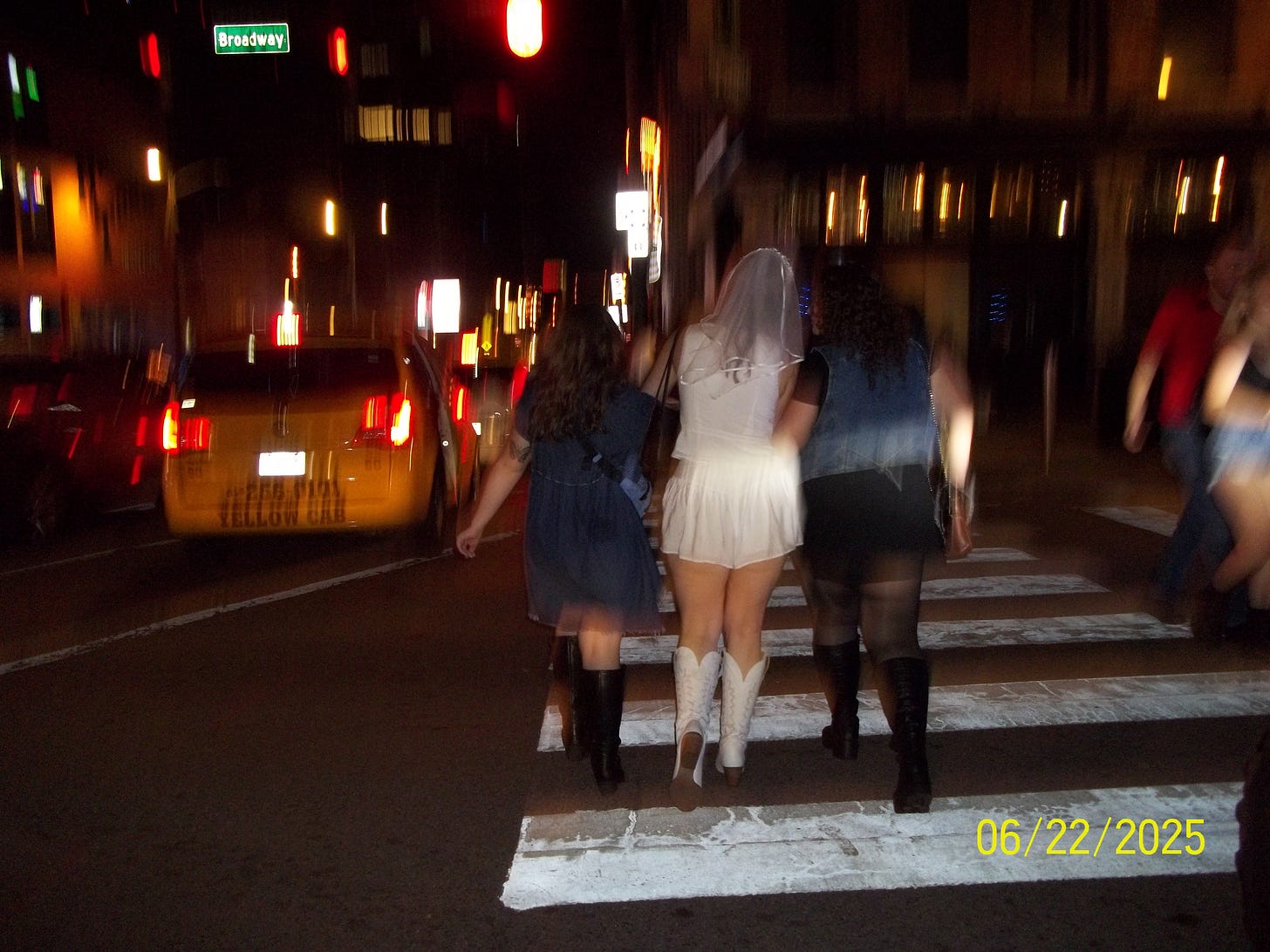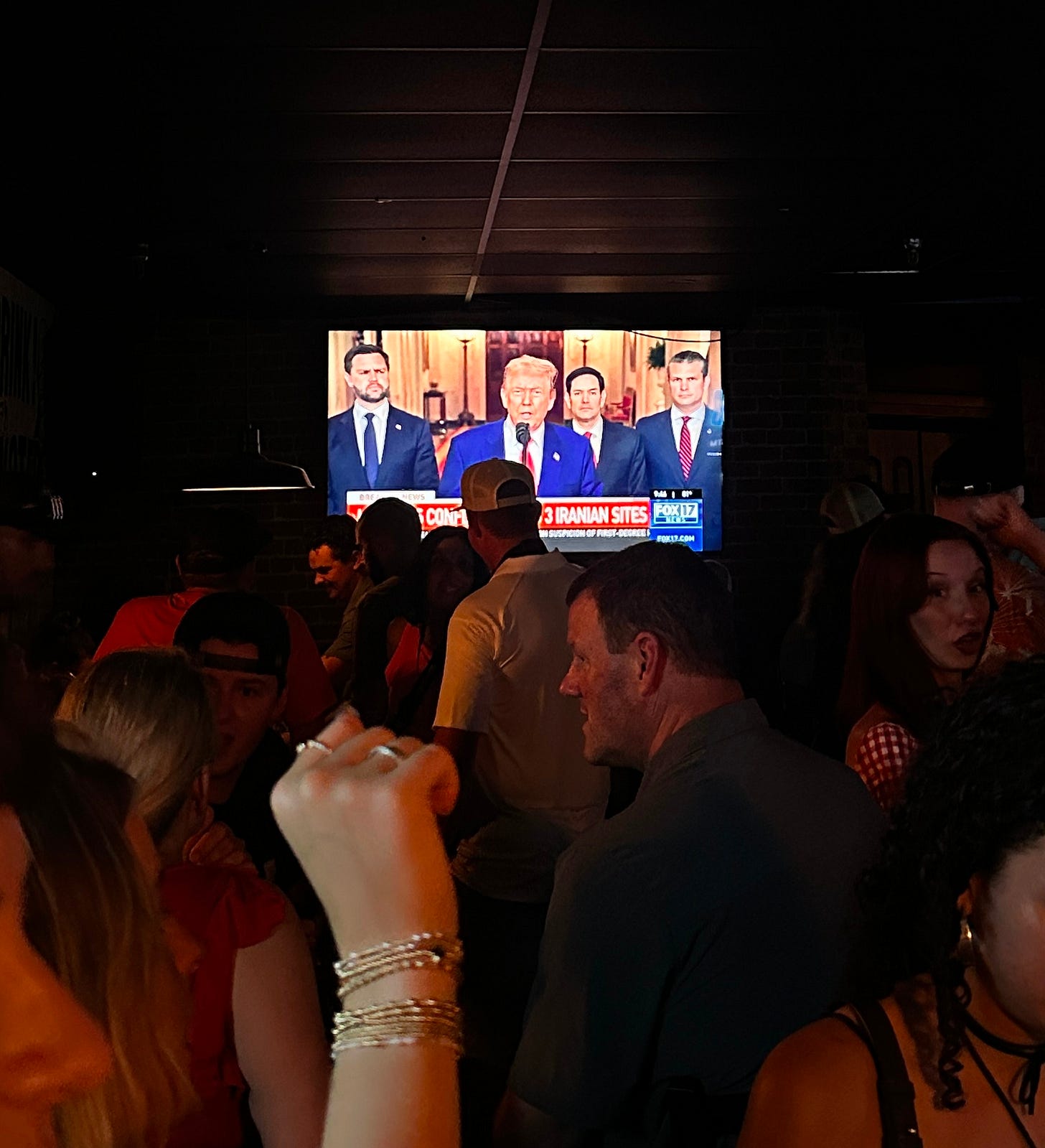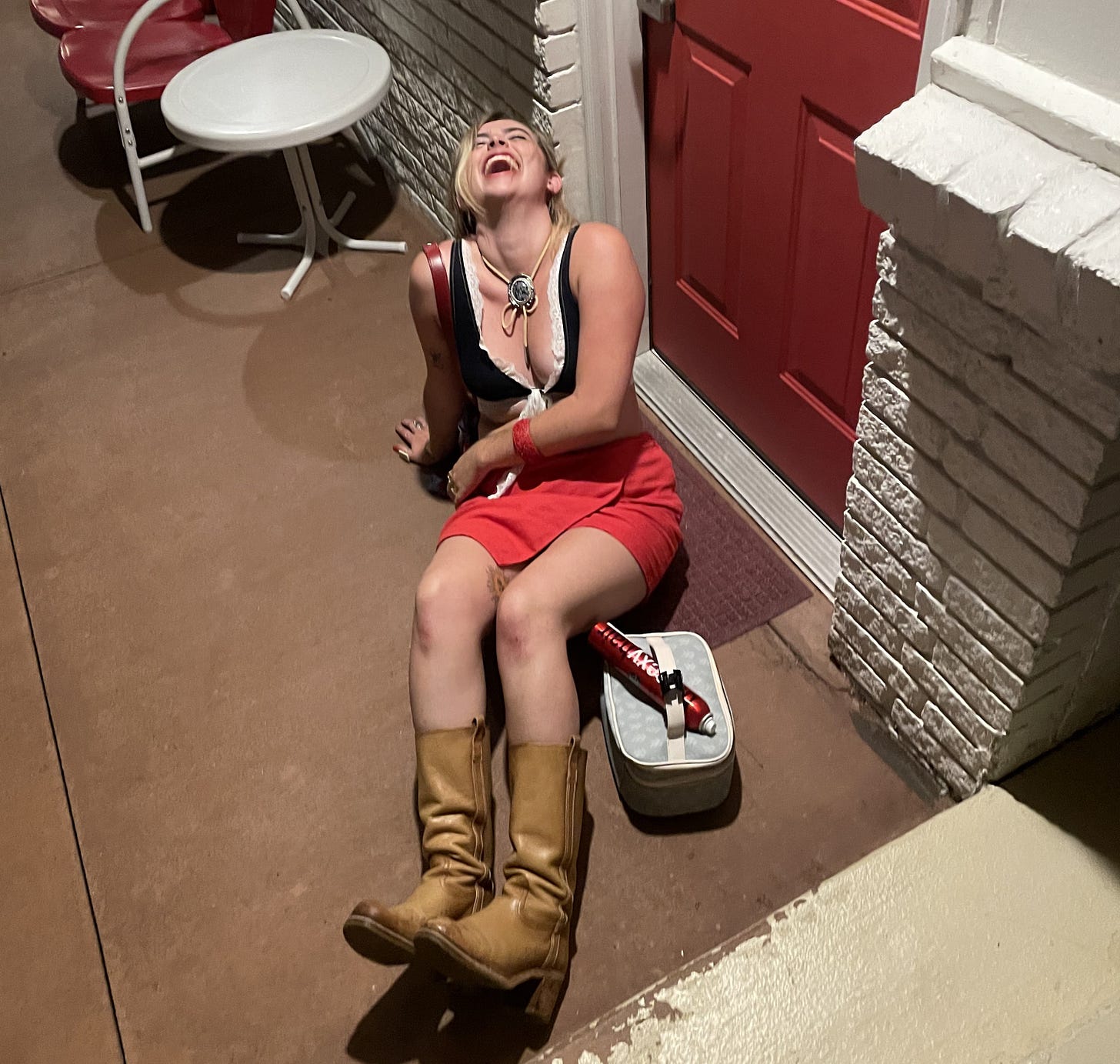On partying through the end times (and realizing it's maybe not the end)
Partying might not save the world, but can it make it something worth saving? It's at least worth 2,000 words of waxing poetic on the club.
Author’s note: Sometimes you start a piece while you’re dooming out about the end of an empire, continue the piece while you’re watching the president stick us smack dab into another war and then end the piece when Zohran Mamdani clinches the democratic nomination for NYC mayor. So you end up with a tonally confusing essay. Enjoy!
It’s starting to feel like the end.
I’m not sure what it’s the end of, but it's certainly got something to do with our current society. I’m a bit of a pessimist. A cynic. So are my friends. For years, we’ve repeated some mantra morphed from “it’s so over” to “we’re so cooked” and its many bastardized offshoots.
The phrase carried us, joking, through COVID-19, gun violence, attacks on reproductive healthcare, an international genocide and a second Trump presidency. We’ve said it enough that the refrain doesn’t totally feel real anymore.
But it all felt a little more tangible when I was standing in a bar on Nashville’s Broadway during a 25-person joint bachelorette/bachelor trip facing a widescreen TV with the local Fox News broadcast as a shitty cover band performed Free Fallin’.
TRUMP CONFIRMS STRIKES TO 3 IRANIAN SITES.
I had seen the news at a tapas place an hour before, but this is a lot more real than my AP notification. It’s also happening in mixed company. It’s not lost on me that Nashville, and Broadway in particular, are not exactly progressive meccas. I don’t even know the politics of the people in the massive wedding party and its plus ones.
We were free falling, that’s for sure. I stared down the barrel of Trump’s gaping maw and thought my little refrain again. We’re cooked. Looking at the sweaty, overheated basement bar, I assessed my options. We had a long night of bachelorette-ing ahead. I had on my grandpa’s bolo tie and a denim bralette, red lip and a glitter eye. My hair was already matted from the humidity.
So I ordered a well tequila soda with lime, dunked my dirty hands into the drink, squeezed the slice and chugged. Because I’m partying through the end times.
I’ve long held a fascination with partying. I have early memories of watching films set in the 1960s-70s, where debaucherous rock stars and groupies would spiral and hit rock bottom with coke on their nose and bottles in hand. I didn’t take away the correct lesson: that’s bad, don’t do that. They were too glamorous.
When Jenny climbed on the balcony to the tune of Free Bird in Forrest Gump, ready to commit suicide with a glittery eyelid and a slinky diva top…. That changed my life. I knew I wanted to stand on a balcony fucked up beyond belief and listen to Lynyrd Skynyrd. Minus the killing myself.
I wanted to be a party girl. A glamorous disco diva, a Penny Lane-style groupie, a revolutionary hippie expanding my mind. I can now sort of see the lessons I was supposed to take via drug and alcohol addiction, spiraling in filthy hotel rooms while you push away loved ones, overdosing in a pair of perfect bellbottoms, etc. etc. This type of partying was a symbol of downfall. The act of sin and numbness that would end the fun.
But I saw the shine. I heard Billy Crudup declare he was the king of the world and I believed him. Partying is not only beautiful, it’s essential to becoming the person I glamorize.
As an adult I had a lengthy party girl evolution. When I first started going to freshman bars in Athens, Georgia I would wear vintage men' s button downs and shove men away from me. I didn’t let anyone buy me a drink for years. I resisted the sorority-style party culture that permeated the local nightlife.
By the time I turned 21, I had fallen in love with cocktails. My parents took me to New Orleans to drink my way through the city’s iconic mixology scene. I had like 14 cocktails in one day. Walking Bourbon Street that night rewired my brain a little. Sour vomit stung at my nose and drunken assholes jeered at me, but a gay middle aged man offered to buy me a birthday shot.
It was filthy and it was glamorous. In the years since, I’ve built a bit of a reputation around loving a good party. I finally started to understand the appeal of a thumping club with neon lights and fog machines.I host themed events religiously and have a dedicated group of divas that I go dancing with. We treasure our nights out and the rituals among them.
By accident, we’ve become the vanguard of Gen Z’s dwindling party scene. My generation has long been known as the age group that abandoned going out. They stay home, doom scroll and whine about their borderline puritanical ideologies. I have to blame the pandemic and addictive screens. But it’s getting dire.
Nightlife is dying. Clubs and bars have shuttered at a shocking rate in Atlanta. I do my part in attending the ones that remain, writing about nightlife when I can. I’ve become a sort of party-girl-reporter. I’m very proud of that title.
It’s all helped to calcify one of my truest opinions: The People need to Party More.
Let’s set some parameters: Partying is about the gathering. It doesn’t require alcohol, or poppers, or cocaine, or cigarettes. Those are all optional. But it necessitates a few things: people, place, a killer playlist and a purpose.
A hang with a few friends in your usual apartment isn’t a party until you give it a theme. Something to coalesce around. A night out isn’t a party until you decide what you need from it. Several cocktails set on fire in a horror-themed bar? Party. Hot mess dance night? Party.
I’m being strict. I’m allowed to be. Over the years, pushback against partying has grown. People in the San Francisco tech sector want daytime Kombucha raves. Hyper-online marxists believe people shouldn’t fall in love and get married and drink wine because the world is ending.
This is immensely stupid. Things are really, really bad. But why should we not party on?
I think partying at its core (at least, under my definition,) is an inherent good. Partying is community. It’s joy. And that makes it all too necessary for the world we live in.
Which is why, even though I might have whiffed it on media literacy when it comes to the whole “don’t glorify addiction” message, I think I took another vital message. Partying is linked with the people, and the people need the party to protest.
In those period pieces like Across the Universe or the jam-packed musical offerings of basically every protest-era song, people were creating art about the war. That art brought them to the party. Marches in the sunshine and clubs at night. The two went hand in hand.
I didn’t totally get why I felt partying and protest were so inextricably linked until I started practicing it. In early March for Our Lives, I spent all my time hanging out with my close friends and other people my age. And we did the obvious thing for unsupervised teenagers: we partied.
The parties hid the underlayer of rage and pain that had infected us all. The cocktail of emotions – using substance to numb feelings we couldn’t cope with, sobering up and getting hit like a truck until we could dull them again – it reminded me of those spiraling rockstars.
It took me until then to understand why the spiral happens, why the addiction is so scary. So I stopped the party and just wallowed in the dark feelings. Nothing to take away the pain.
The feelings eventually faded. I was still getting the constant inundation of negativity. Newsfeeds of white supremacy and mass death and virulent hate clogged my brain. Social media poured infighting and evil out at all hours. It made me want to bash my head in.
So I burnt out. I retreated. There was no source of joy. Activism was depressing, neverending. I didn’t know how to reframe.
It took a casual conversation with a friend (now a Gen-Z Congressman) in our local coffee shop that helped me reevaluate. He asked me where the protest came from. What was the emotional core?
I told him it was anger and grief. That was true. It’s still sort of true. I was grieving what had happened and angry the world was letting it happen again. I wanted everybody else to be angry, too. But the friend told me those feelings could consume me. That I couldn’t sustain it.
And I could not. I became a bad person with my anger. I started letting it consume me. I became angry at everything and everyone. I didn’t know how else to be. Until he suggested: Why not let it be love?
It was a philosophy I heard from veteran organizers in the years that followed. Let love guide your activism, your protest. Love for the people and love for a better future. Even and perhaps especially when it seems like the end times. The feeling was rooted in strong community ties. It didn’t prohibit anger, but love could renew. Community could re-energize.
But knowing that is only one thing. Once I started finding friends I eased up on some of the anger, but we matched each other’s cynicism. We are, unfortunately, grade-A bitches and haters.
Until we partied. There’s something about the process that opens us up. The gossip fades away as we layer on makeup and hairspray, the cynicism moves out to make room for our pregame playlists and outfit planning.
Once we make it to the club, our bodies are absorbed into the throng. By now our clear liquor can go down like water. We might get a drink poured on us, or elbowed in the back, but it doesn’t really matter. Because the alcohol and the ambiance and the booming bass convince us: everyone in this room is good.
It’s a fleeting reprieve from the world. To believe the people around you are beautiful and wonderful. A baseline I didn’t have for a really long time. It’s an optimism that renews even the darkest mood. And when the party renews, I can do it all night long.
I dance for hours until my knees feel arthritic and my hair is knotted together, but when I do it I feel like maybe the world isn’t beyond repair. Maybe people are not damned. It’s a necessary reminder.
I’m not the only one who feels it. The most beautiful fleeting connections I’ve ever made happen in the patios of tiny Atlanta clubs. Sticky heat shared among strangers who are too drunk to remember my name. One girl asked recently if my name was Kahlonega. She invited us to her birthday party (we didn’t go.) We helped her relocate her missing friends and laughed for ages.
Sometimes I follow these strangers on social media. Sometimes it doesn’t go further than a fleeting interaction on the dance floor, a shared bond over a band tee or a hairstyle. That’s okay.
Because there’s something transcendent about that space. It’s almost religious, to have your hands in the air as you scream because Anthems by Charli XCX is on and you’ve never heard it in the club before. To jump together and almost break your ankle because the floor is filled with feet and people are spilling drinks all over you. To smell like a distillery mixed with sweat and know there won’t be a shower before bed. The sheets will need a wash in the morning.
On its face this might seem silly, vapid. Partying doesn’t carry the same merit as posting or protesting. I’m not suggesting that it's praxis. I’m just saying it might be the renewal we need when we all burn out. When we decide the world is inherently bad and beyond repair, are we considering the drunk girl in a bar bathroom? The diva who loves your hair? The DJ who took your obnoxious song request because you just seemed so excited?
The bonds are fleeting, as are the memories. The next morning my body will inevitably ache. I usually take a half day to recover from neck pains I gave myself dancing. I will sit in the bathtub and soothe my aching muscles. Scrub off the sweat and liquor. Chug a gallon of water. Reflect.
But I never regret it. In Nashville, we returned for a post-game at the motel and I promptly ate shit. (I had just made fun of my roommate for falling down, too.) It hurt like hell. I couldn’t stop laughing. When I woke up the next day my skinned knees had scabbed over. Proof of the party.
I wore them proudly.






The Holocene is over. The Great Hedon begins.
I loved this and relate deeply